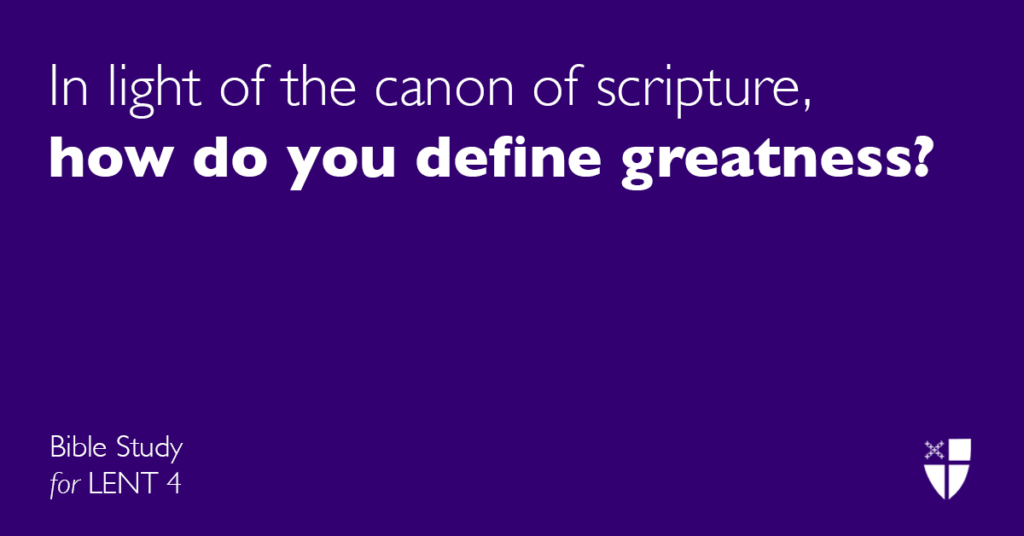This page is available in: Español
Bible Study: Lent 4 (A) – 2020
March 22, 2020
1 Samuel 16:1-13

How one comes to assume the role of leadership is often a concern not just in the Old Testament, but throughout the canon of scripture. Often, it is the one least expected who assumes the mantel of leadership. Samuel mistakenly assumes that Jesse’s firstborn is to be the anointed one. Yet, countering the societal expectations of that time, not only is the eldest son not selected, but six of his younger brothers are passed over as well. The youngest and least likely to be selected is chosen, despite the societal view of merit based on birth order. How often do we overlook the possibilities of one that does not match the expectations of our society?
With such a purposeful selection of David, it’s easy to see that he did not come to the throne by chance. God chooses David, adhering to God’s own criteria for leadership, despite the expectations of the qualities of leadership of the day. Society expects that those who are viewed as the greatest are to lead while those viewed as the least are to follow. How often are we reminded that God’s ways are not our ways?
- In light of the canon of scripture, how do you define greatness?
- How does your definition of greatness converge or diverge from with societal views?
Psalm 23
This pastoral psalm is a popular choice used to comfort the bereaved at the time of the death of a loved one. It reminds us that sorrow is a transitory condition to which ultimate relief will come. Until that time, while we may walk the sorrowful path, God does not leave us to walk it alone. As we experience dark times, he is there to comfort and to guide us through them. How often do we mistake the protective staff of the shepherd as one that prevents harm, rather than the guiding staff that leads us out of harm?
God’s favor falls equally on the just and the unjust. A feast with guests that include both the just and the unjust demonstrates that God doesn’t advantage some while disadvantaging others. The table God sets is for everyone. Like the host of a dinner, God has a relationship with each of us regardless of the relationship we may have with one another. We are all his own and God’s desire for relationship with God’s own is unyielding. How often do we assume that God’s view of others mirrors our own?
- In what ways does God comfort and guide us?
- How does the knowledge that God loves us as much as those that we do not influence how we engage with one another?
Ephesians 5:8-14
Light versus dark and new versus old are dramatic contrasts. Framing things by extremes suggests clarity rather than murkiness. This passage sharply draws a contrast between the old life characterized by the things valued by the world and the new life characterized by following Christ. This letter to the Ephesians sets the standard of God and Christ as the models for personal relationships and conduct. This is a high standard indeed. At some point, we all will fall short of hitting the mark.
Both light and dark and old and new require an observance of the gradual conditions between them. They imply movement. Old will always be replaced by new. Darkness will always be followed by light that in turn will be followed by darkness. We will continually experience the cycles of both.
- How do you, on your journey of faith, give yourself license to experience both light and dark and the shades of gray that exist between them?
- How do you resume the goal of following the model of God and Christ for personal relationships and conduct when you fall short of hitting the mark?
John 9:1-41
Our relationship with organized religion can sometimes be fraught with difficulty. The question “Who is the sinner?” is front and center in this passage. The quest to determine the cause of the man’s blindness has the potential to lead them down a rabbit hole. Does it really matter who sinned to cause this man’s blindness in light of the fact that the man has a need that must be addressed? As one possessing the perceived imperfection of blindness, the man was forced to exist outside the community of worship and forever destined not to be permitted beyond the gates to the synagogue. The blind man in the story may represent the Christian community in struggle with the synagogue authorities. How often do our places of worship exclude rather than include?
The fear of being excluded from the fellowship of community is quite high. When questioned about how their son regained his sight, the man’s parents feign ignorance. It stands to reason that he would have shared the story of his regained sight with those on whom he was forced to depend all of his life. Out of fear of exclusion from the synagogue community, instead of providing an answer, they say, “Ask him,” and thereby condemn their son to the fate they feared. How often have we sat silent in the face of the need of another because we fear exclusion?
- In what ways do we as the Church exhibit our blindness?
- In what ways can we as the Church right the wrongs of turning a blind eye to the exclusion of others?
Kevin Barron is a student of the Diocese of Central Pennsylvania’s Stevenson School for Ministry.
This page is available in: Español
Don’t forget to subscribe to the Sermons That Work podcast to hear this sermon and more on your favorite podcasting app! Recordings are released the Thursday before each liturgical date.
Receive Free Weekly Sermons That Work Resources!
This page is available in: Español


